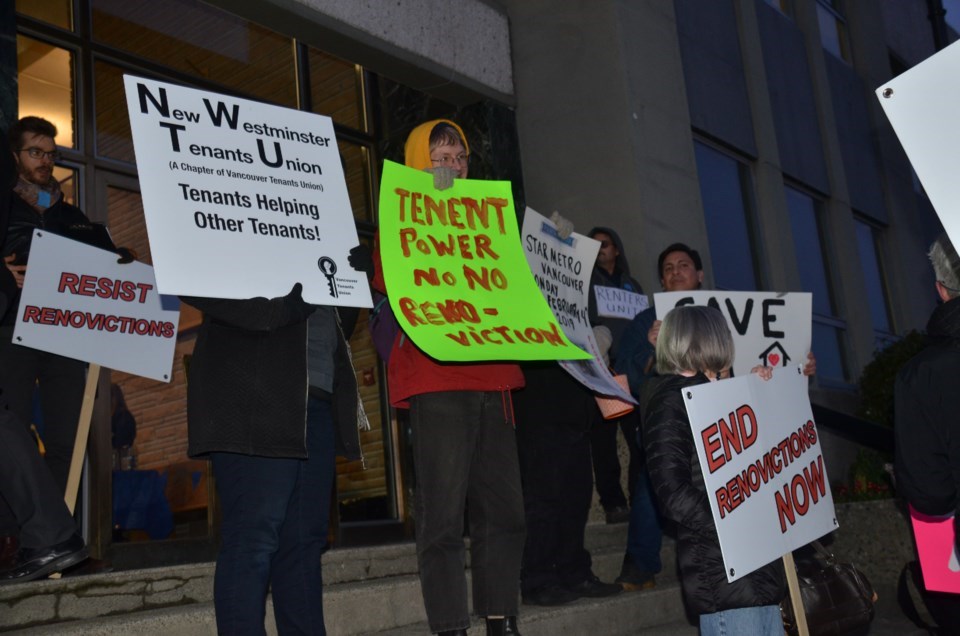New West is taking steps to beef up its tenant protection policy, but it means an update to the homelessness needs assessment won’t be done until later in 2025.
At its Sept. 9 meeting, council unanimously voted in favour of directing staff to update the City of New Westminster’s tenant relocation policy using Burnaby’s policy as a model. The goal is to provide greater support for tenants who may be displaced from their homes.
Several tenants attended the June 10 meeting to urge council to support the tenant protections motion submitted by councillors Ruby Campbell and Nadine Nakagawa.
“This motion was in response to new provincial housing legislation which increased allowable densities around transit stations,” said a report to council. “This legislation, under favourable economic conditions, could make some sites, including those accommodating older and more affordable rental housing units, more attractive for redevelopment.”
According to the report, New Westminster has the third largest number of purpose-built market rental units in Metro Vancouver. The city currently has 10,284 units in 311 buildings – with more than 80 per cent of them having been built before 1970.
The report noted this stock provides “important and more affordable market rental housing” due to its age and because many tenants have lived in those buildings for lengthy periods of time.
The City of New Westminster developed its current tenant relocation policy in 2015.
“While this policy was considered a best practice at the time, other municipalities have since developed policies which offer greater assistance and compensation, and in some cases, replacement housing,” said the staff report.
The report states Burnaby’s policy is seen as one of the more progressive in Canada in accommodating and assisting tenants of multi-family market rental buildings who are displaced from their homes due to redevelopment or renovation that requires rezoning. It said Burnaby’s policy includes enhanced financial support for moving, enhanced financial compensation in the form of rent top-up payments or lump sum payments, and the right to return to the redeveloped building at the same rent (plus any Residential Tenancy Act rent increases) in a unit with the same number of bedrooms.
Now that council has approved the motion, staff will begin to engage with their peers in Burnaby about that city’s policy, the implications, and lessons learned since its policy was developed. New West staff will do some analysis on the issue and bring back an updated policy and bylaw for council’s consideration.
Although there are no financial implications to doing this work, other than the required staff time, the report stated that prioritization of this work means “pausing” work on other social planning work. Staff recommended the homelessness needs assessment, which was scheduled to begin this year, be rescheduled to begin in the second or third quarter of 2025.
Coun. Nadine Nakagawa said she appreciated knowing what work could be displaced if this policy work is prioritized.
“I think it's really important to see this as homelessness prevention,” she said. “If we displace a lot of tenants … this will have a really negative impact on rates of homelessness in our community, because rent has gone up a lot over the past number of years.”
Nakagawa questioned if delaying work on the homelessness needs assessment would impact the potential for applying for grants or services related to homelessness.
John Stark, manager of community planning, assured council the city would still be able to provide faith-based and non-profit organizations with the information they may need in applying for grants.
Coun. Daniel Fontaine questioned when staff would be able to begin work on the homelessness needs assessment.
“I'm always a bit nervous when I see the word pause, because pause can be for like a week, pause can be for a year, a pause could be for a long time,” he said. “Does the staff have any sense of how long this pause will be and when work would recommence on the homelessness needs assessment?”
Jackie Teed, the city’s director of planning and development, said staff cannot provide an estimate at this time as to when that work would begin. She said staff’s work plan is constantly being reevaluated and assessed based on council direction and the timelines of other work that is taking place.
“The homelessness assessment would remain a priority for us, and we would be looking for an opportunity to bring it up again,” she said.



